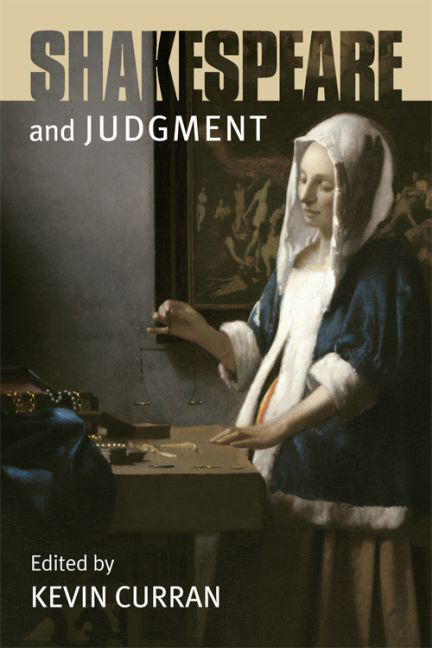Book contents
- Frontmatter
- Contents
- Acknowledgments
- List of Contributors
- Introduction
- Part I Staging Judgment: Deliberation in the Plays
- Part II Audience Judgment: Deliberation in the Theater
- Part III The Ethics of Judgment
- 8 Antinomian Shakespeare: English Drama and Confession Across the Reformation Divide
- 9 Bracketed Judgment, “Un-humanizing,” and Conversion in The Merchant of Venice
- 10 The Judgment of the Critics that Makes us Tremble: “Distributing Complicities” in Recent Criticism of King Lear
- Index
10 - The Judgment of the Critics that Makes us Tremble: “Distributing Complicities” in Recent Criticism of King Lear
from Part III - The Ethics of Judgment
Published online by Cambridge University Press: 10 May 2017
- Frontmatter
- Contents
- Acknowledgments
- List of Contributors
- Introduction
- Part I Staging Judgment: Deliberation in the Plays
- Part II Audience Judgment: Deliberation in the Theater
- Part III The Ethics of Judgment
- 8 Antinomian Shakespeare: English Drama and Confession Across the Reformation Divide
- 9 Bracketed Judgment, “Un-humanizing,” and Conversion in The Merchant of Venice
- 10 The Judgment of the Critics that Makes us Tremble: “Distributing Complicities” in Recent Criticism of King Lear
- Index
Summary
Something odd has happened in recent criticism of King Lear. Two of the strongest and most influential critics of our time, Stanley Cavell and Harry Berger Jr., have devoted a great deal of their effort in relation to this play to showing that there is virtually no difference, when the play is looked at closely, between the characters normally characterized as “good” (Berger almost always uses scare quotes for this word) or (if I may coin an intuitively obvious ethical category) mixed, and those who are wicked (or “wicked”). This critical practice has produced, as I will try to show, some astonishingly bizarre claims along with many less spectacular dubious or false ones. So, to my mind, the interesting question – aside from the analysis of the mechanisms that produce these readings (which will constitute the bulk of this chapter) – is why these readings, if they are as flawed as I suggest, have had the power and influence that they have had. Subsequent critics often take it that “Cavell has established” this or that, or “Berger has established” this or that. I wish I could give a good account of the success of these readings and of these ways of reading. But I will make a preliminary attempt.
Part of the success, I would say, derives from the special standing of Cavell in the world of literary, and especially Shakespeare, criticism. He brings with him the authority that comes from his constantly enacted membership in a more intellectually elite group within the academy than English professors: he is a philosopher. But other philosophers have written on Shakespeare without having made a dent or even a ripple on our field. The reason why Cavell has been so singularly influential may have to do with the fact that he does his philosophical work with literary texts more or less within the protocols of our field, so he speaks as an insider and an outsider simultaneously – a very powerful position. His conception of philosophy does not generally involve any technical work (though he has done this in some of his “straight” philosophical writing), but revolves around terms that are resonant in the worlds of ethics, psychology, and religion: recognition and acknowledgment.
- Type
- Chapter
- Information
- Shakespeare and Judgment , pp. 215 - 234Publisher: Edinburgh University PressPrint publication year: 2017

